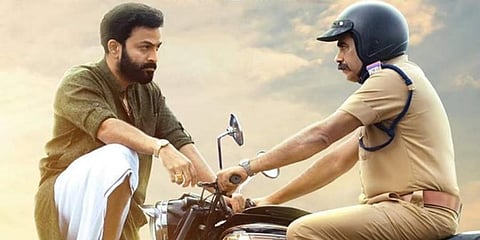

What begins as a small but fairly tense confrontation between two individuals snowballs into something far uglier in writer-director Sachy’s Ayyappanum Koshiyum. Ayyappan Nair (Biju Menon) is a middle-aged policeman on the verge of retirement and getting a medal. But these prospects are threatened when, one night, he apprehends a retired havildar named Koshy (Prithviraj) for transporting bottles of booze in ‘dry’ territory. When Koshy’s ego is bruised, somebody is slapped by somebody, and it soon turns into a war fought more with words and thoughts than weapons.
This is a film dripping with machismo and testosterone. Sachy sets up his two main characters in the opening scenes, giving an idea of the size of their egos and the extent to which they can go. But this is not just about the egos of Koshy or Ayyappan but also Koshy’s father, Kurian (Ranjith). Ayyappan is revealed to have a fascinating past which explains the beastly side of him whereas Koshy’s character is shaped by his lineage and his time in the army. Sachy opens the film with a sequence whose context begins to make more sense only in the film’s latter portions.
Kurian’s past is mentioned too. He is an old man bursting with excessive pride and trying to relive his glory days by intervening in Koshy’s matters, much to the latter’s chagrin. Here is a son caught between settling matters on his own and trying to appease his father. And being the loose cannon that he is, Ayyappan doesn’t waste an opportunity to give Koshy a taste of the level of havoc he can create. Things reach a point where Koshy has to be protected from Ayyappan.
But in spite of the pressure cookerlevel intensity that Sachy aims for, he is careful not to go full dark, even when things seem to go beyond the characters’ hands. At one point, a police officer asks, “What is this—a wild west movie?” I was thinking of the same thing. There are enough reasons to think that way. Sachy’s examination of his characters is more or less similar to what Italian filmmaker Sergio Leone did with the male characters in his iconic westerns. Prithviraj and Biju are to Sachy what Clint Eastwood and Lee Van Cleef were to Sergio Leone.
But what’s also admirable about Sachy’s writing is that he gives space for the women. Though the men are constantly trying to shield their loved ones from the after-effects of the central conflict, the women are perfectly capable of taking care of themselves and do not refrain from answering back or slapping a man when the situation demands it. Gowri Nandha is outstanding as Ayyappan’s wife, and Anna Reshma Rajan, as Koshy’s wife, gets her own applause-worthy moment as well.
But the applause in the film is not always reserved for moments of one-upmanship, but also humiliation. By occasionally subjecting his characters to mockery, Sachy keeps them grounded. Koshy has so much in common with Mohanlal’s Mangalassery Neelakantan from Devasuram (Koshy even has a much older assistant-cum-driver reminiscent of Innocent’s Warrier). Also, casting the writer of Devasuram as Koshy’s father is an inspired choice.
Sachy makes the best use of Prithviraj’s charisma and his ability to play characters who can be arrogant and vulnerable at once. The scenes where one can sense fear on his face are among the film’s funniest moments. We also get a few laugh-out-loud situations courtesy of a gang of thugs sent by Kurian to deal with Ayyappan. Sachy has already proved in his earlier scripts that he has a gift when it comes to balancing light and dark moods in the most appropriate of places. And it’s great to see Biju Menon have fun with a role that requires him to play someone who appears calm on the surface but conceals a volcanic-level intensity which can erupt anytime.
I would be remiss if I did not mention Sudeep Elamon’s excellent camera work. He has already proved his talent for generating tension by giving his camera movements a tempo that perfectly matches the action. Also, the action in the film—verbal or otherwise—is mostly captured in close quarters. And because the camera is near the actors most of the time, it’s impossible to tell whether any of them has used body doubles. The climactic mud fight, in particular, is impressively shot.
This is essentially a masterclass by Sachy on how to make a three-hour film by relying mostly on dialogues which carry enough power to not just reverberate through the walls of the movie hall but also each cell and nerve in your body. With a script like this, one doesn’t need bullets or pyrotechnics to excite the audience. Sachy does that with his characters, a rare skill that not many filmmakers possess today in Malayalam cinema.